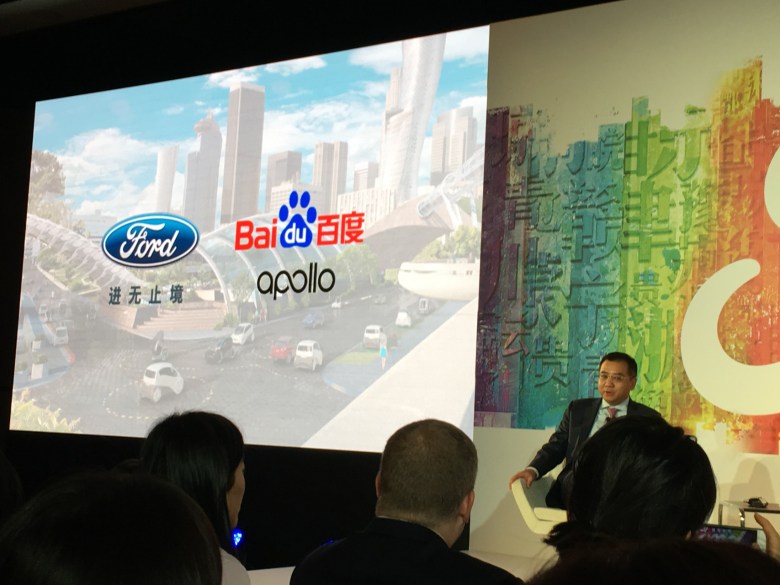Ford outlined the next phase of its China expansion strategy today, focusing on SUVs, electric and connected vehicles, a streamlined business structure and closer connections to Chinese customers. Jim Hackett, CEO of Ford Motor Co mentioned that the speed of decision making is much faster in China than the US, and said Peter Fleet, Group Vice President & President, Ford Asia Pacific and Jason Luo, Chairman and CEO, Ford China are now fully in charge of China market.
“The evidence is that [our] Chinese organization is run in China,” Hackett said at the press conference held in Shanghai.
“China is not only the largest car market in the world, it’s also at the heart of electric vehicle and SUV growth and the mobility movement,” said Bill Ford, Executive Chairman of Ford.
Here are six things that we learned about Ford’s plan to bring more smart vehicles into China by 2025.
1. All new cars will be internet-connected by 2019

By the end of 2019, 100 percent of new Ford and Lincoln-branded vehicles in China will be connected through either embedded modems or plug-in devices. Ford’s company leaders also said they are working on broader infrastructure opportunities to improve future mobility experiences. Ford’s investment in electrified vehicles is to date $4.5 billion.
2. Ford will introduce more than 50 new vehicles in China by 2025

Ford plans to offer more than 50 new Ford and Lincoln vehicles in China by 2025, and at least 15 new electrified vehicles from Ford and Lincoln. And the new Zotye-Ford joint venture will deliver a separate range of affordable all-electric under a new brand, pending regulatory approvals.
Ford said that they will contain structural cost in the region throughout 2018 to grow its China revenue by 50 percent by 2025 versus 2017.
3. Ford continues working with Baidu on autonomous vehicle development

Ford is one of the founding members of the Board of Baidu’s Project Apollo, building on the agreement signed earlier this year.
In 2014, Ford developed a China market-targeted SmartDeviceLink, an open-source voice commander, together with leading Chinese mapping service providers Baidu and AutoNavi. Last year August, Ford and Baidu jointly invested $150 million in Velodyne LiDAR, a company that makes sensors for autonomous cars’ mapping, localization, object identification, and collision avoidance.
The Apollo Open Platform accelerates the development, testing and deployment of autonomous vehicles. The TechNode team actually had a chance to try out their autonomous cars in this July, when Baidu released their autonomous driving ecosystem Apollo 1.0 with their 50 partners, including Ford.
Ford’s participation supports the company’s robotics and artificial intelligence research efforts and provides an opportunity to contribute to a platform that will be key to developing autonomous vehicles in China.
“We are responding to the rapid pace of change by delivering increased connectivity and working to improve and simplify mobility for everyone,” Hackett said. “This builds on our commitment to deliver smart vehicles for a smart world, helping people around the world move more safely, confidently and freely.”
4. Ford puts importance on SUVs in China

Starting in 2019, the company plans to locally assemble five more vehicles in China for Chinese customers including a Lincoln premium SUV and the company’s first global all-electric small SUV. The expanded product portfolio reflects an even stronger emphasis on SUVs. As Chinese families start to have two children after putting down one-child-policy last year, SUVs will be a more attractive option for Chinese consumers.
“From luxury Lincolns to Ford cars and SUVs, to an all-new electric vehicle brand, we will meet the growing desire and need in China for great new energy vehicles,” said Jason Luo, chairman and CEO of Ford China.
Ford said Lincoln, Ford’s luxury brand in China, will maintain its separate dealer network to offer its one-size-fits-one customer experience.
5. Ford is strengthening ties with its joint venture partners Changan and Jiangling in 2018

Ford is strengthening ties with its joint venture partners Changan and Jiangling in 2018, establishing one distribution services division responsible for the marketing, sales, and services associated with all Ford vehicles sold in China.
“Now is the time to deepen the partnerships we have with Changan and Jiangling Group and present one Ford brand in China,” Fleet said. “The new distribution services division will enable us to offer an enhanced experience for our customers and more closely connect with our dealers and the community.”
“All of the actions outlined today reflect an unprecedented commitment to focus on the needs of consumers in China through a more fit and streamlined Ford,” he added. “They are proof of our dedication to grow our business in China.”
6. Ford wants to cater to Chinese consumer’s taste

In 2019, the company will start producing five additional Ford and Lincoln models in China to further tailor vehicles to more closely meet the needs of Chinese customers.
“Some of our most advanced manufacturing and innovation facilities are here in China,” said Fleet. “Producing more vehicles for China locally allows us to improve the benefits for our customers, our partners, and our bottom line.”
Ford last month opened the Nanjing Test Center, which includes close to 80 different types of real road surface conditions, a three-kilometer test track and a sophisticated emissions testing facility, to speed development of new products, services, and technologies to meet the unique driving requirements of Chinese customers. Jason mentioned that there are 2,000 engineers working in Nanjing.
The company also launched Quick Lane, its customer service provider in Nanjing and Chongqing this month, offering routine vehicle maintenance and light repair services. Ford plans to open 100 new outlets next year.

